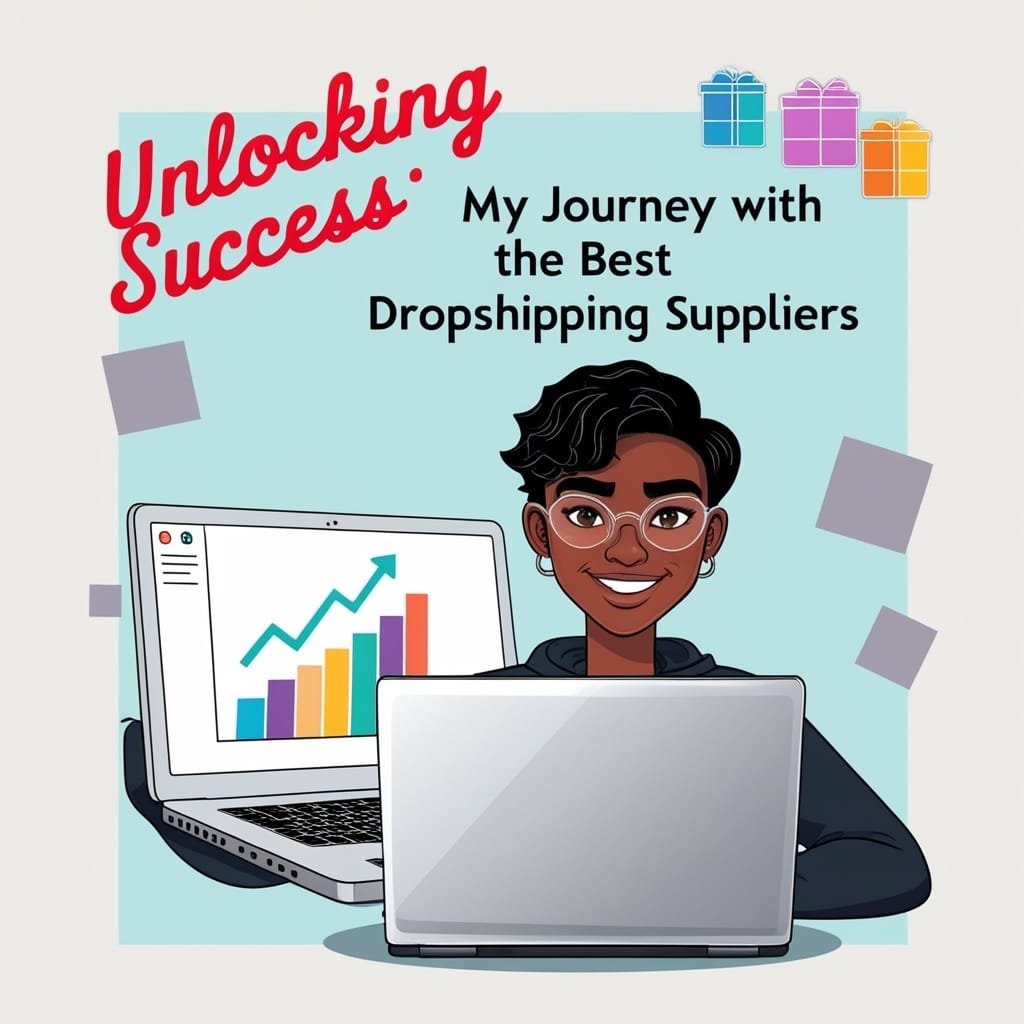Best Dropshipping Suppliers: The Ultimate Guide for 2025

In the fast-paced world of eCommerce, dropshipping continues to be one of the most accessible business models for entrepreneurs looking to break into online retail without significant upfront investment. As someone who’s built multiple six-figure dropshipping businesses over the past decade, I can attest that your choice of suppliers is perhaps the single most crucial decision you’ll make.
The right dropshipping partner doesn’t just provide products—they become an extension of your brand, handling inventory management, packaging, and shipping while you focus on marketing and customer service. In this comprehensive guide, I’ll walk you through the best dropshipping suppliers of 2025, based on reliability, product quality, pricing, shipping times, and overall value.
How to Evaluate Quality Dropshipping Suppliers
Before diving into specific recommendations, it’s important to understand what separates premium dropshipping suppliers from mediocre ones. When vetting potential partners, I always consider these critical factors:
Product Quality and Selection The products you sell directly impact your brand reputation. Quality suppliers offer:
- Consistent manufacturing standards
- Diverse product catalogs with regular updates
- Samples for quality assessment before listing
- Detailed product specifications and high-resolution images
Shipping and Fulfillment Capabilities In the age of Amazon Prime, customers expect fast shipping. Top-tier suppliers provide:
- Multiple shipping options (economy to express)
- Accurate tracking information
- Reasonable shipping timeframes
- Order fulfillment rates exceeding 95%
Pricing and Minimum Order Requirements Your profit margins depend heavily on your supplier’s pricing structure:
- Competitive wholesale pricing
- Transparent fee structures without hidden costs
- Low or no minimum order requirements
- Volume-based discounts as your business scales
Integration and Technology Modern dropshipping relies on seamless tech integration:
- Direct API connections to your eCommerce platform
- Automated inventory updates
- Order processing systems
- Returns management capabilities
Customer Service and Communication Never underestimate the importance of responsive support:
- Dedicated account managers
- Multiple communication channels
- Quick response times
- English-speaking support staff
Top Global Dropshipping Suppliers
1. AliExpress Dropshipping
AliExpress remains the giant in global dropshipping, connecting merchants with thousands of manufacturers primarily based in China.
Pros:
- Massive product selection across virtually every category
- No minimum order requirements
- Competitive pricing
- User-friendly platform with supplier ratings
- Integration with most eCommerce platforms via apps like Oberlo and DSers
Cons:
- Longer shipping times (typically 15-30 days)
- Variable product quality
- Limited control over packaging
Best for: New dropshippers testing products or entrepreneurs with limited startup capital.
“AliExpress’s enormous product catalog allowed me to test dozens of niche products with minimal risk. Once I identified winners, I moved to more premium suppliers for those specific items.” – Jason Wong, eCommerce entrepreneur
2. Spocket
Spocket has emerged as a premium alternative to AliExpress, focusing on US and EU suppliers with faster shipping times.
Pros:
- 5-7 day average shipping to US/EU customers
- Higher-quality products from vetted suppliers
- Branded invoicing options
- Seamless Shopify, WooCommerce, and Wix integration
- Sample ordering capability
Cons:
- Higher product costs than Asian suppliers
- More limited product selection
- Premium features require higher subscription tiers
Best for: Dropshippers focusing on US and European markets who prioritize shipping speed and quality over maximum margins.
3. SaleHoo
Operating as both a directory and wholesale marketplace, SaleHoo connects dropshippers with over 8,000 verified suppliers.
Pros:
- All suppliers are thoroughly vetted
- Excellent educational resources for beginners
- Strong community and support system
- Market research tools to identify trending products
- 60-day money-back guarantee
Cons:
- Annual membership fee
- Not a direct ordering platform
- Requires contacting suppliers individually
Best for: Intermediate dropshippers looking for reliable supplier relationships and research tools.
Best US-Based Dropshipping Suppliers
4. Inventory Source
Inventory Source stands out as an automation-focused dropshipping solution with an extensive network of US suppliers.
Pros:
- Over 230 pre-integrated suppliers
- Full automation of product data and order routing
- Integrates with 25+ eCommerce platforms
- US-based shipping with faster delivery times
- Excellent for multi-supplier management
Cons:
- Monthly subscription required
- Learning curve for full automation setup
- Limited customization for product listings
Best for: Established dropshippers looking to scale operations with automation.
5. Doba
Doba’s centralized marketplace approach simplifies working with multiple US suppliers.
Pros:
- Single dashboard to manage all supplier relationships
- Curated product catalog with standardized data
- Export features for easy product listing
- Returns management system
- US-based customer service team
Cons:
- Higher per-product costs
- Annual or monthly subscription required
- Extra fees for premium features
Best for: Dropshippers who value convenience and standardization over maximum margins.
6. Wholesale2B
With connections to over 100 dropship suppliers, Wholesale2B provides a comprehensive solution for US-focused operations.
Pros:
- Over 1.5 million products available
- Multiple integration options (including custom websites)
- Auto order processing
- Data feed management
- No transaction fees
Cons:
- Interface can feel outdated
- Plan structure can be confusing
- Limited customization options
Best for: Entrepreneurs looking for a wide variety of US products with reasonable shipping times.
Niche-Specific Dropshipping Suppliers
7. Beauty Joint (Beauty and Cosmetics)
Specializing in beauty products, Beauty Joint offers dropshipping services for cosmetics retailers.
Pros:
- Authentic, name-brand cosmetics
- Competitive wholesale pricing
- Fast US shipping
- Trending beauty products
- Low minimum orders
Cons:
- Sector-specific inventory only
- Some exclusivity requirements
- Limited international shipping options
Best for: Beauty-focused eCommerce stores seeking authentic products.
8. GreenDropShip (Organic and Natural Products)
As consumer demand for sustainable products grows, GreenDropShip has positioned itself as the go-to supplier for natural and organic merchandise.
Pros:
- Over 20,000 natural, organic, and gourmet products
- US-made items with fast shipping
- Food, beverages, essential oils, vitamins, etc.
- Shopify, WooCommerce, and Amazon integration
- Wholesale pricing on premium brands
Cons:
- Membership fee required
- Higher product costs (but higher margins)
- Specialized inventory management for perishables
Best for: Eco-conscious entrepreneurs targeting the growing natural products market.
9. Modalyst (Fashion and Accessories)
Modalyst connects dropshippers with independent brands and fashion wholesalers.
Pros:
- Curated fashion from independent designers
- Name brands available on higher plans
- Fast US and EU shipping
- Automated price rules
- Easy product import to Shopify, Wix, and BigCommerce
Cons:
- Transaction fees on certain plans
- Limited customization options
- Higher product costs
Best for: Fashion-forward online boutiques looking for unique, trendy items.
Print-on-Demand Dropshipping Services
10. Printful
Leading the print-on-demand space, Printful offers custom-printed products created and shipped on demand.
Pros:
- Over 300 customizable products
- Integration with most major eCommerce platforms
- White-label service with custom packaging
- High-quality printing and embroidery
- Global fulfillment centers
Cons:
- Higher per-item costs than bulk manufacturing
- Limited product customization outside printing areas
- Shipping costs can add up
Best for: Brand-focused entrepreneurs selling custom designs on apparel and merchandise.
11. Printify
Printify’s network model connects merchants with multiple print providers.
Pros:
- Often lower prices than competitors
- Larger selection of print providers
- More product options in certain categories
- Free plan available for small stores
- Global printing network
Cons:
- Quality can vary between print providers
- Less consistent shipping times
- Customer service can be slower
Best for: Price-conscious merchants in the custom merchandise space.
Wholesale Dropshipping Platforms
12. Worldwide Brands
Operating since 1999, Worldwide Brands is one of the most established wholesale supplier directories.
Pros:
- Over 16 million certified wholesale products
- Lifetime membership with one-time fee
- All suppliers verified as legitimate wholesalers
- No per-order fees or ongoing costs
- Market research tools included
Cons:
- Significant upfront investment
- Not a direct ordering platform
- Requires contacting suppliers individually
Best for: Serious long-term eCommerce businesses seeking legitimate wholesale relationships.
13. CJDropshipping
CJDropshipping has grown rapidly as a full-service alternative to AliExpress with added capabilities.
Pros:
- Product sourcing, storage, and fulfillment services
- Custom packaging and branding options
- Processing centers in multiple countries
- No monthly fees or minimum orders
- Product customization capabilities
Cons:
- Website can be difficult to navigate
- Variable customer service experiences
- Shipping estimates sometimes optimistic
Best for: Dropshippers wanting expanded services like custom packaging while maintaining competitive pricing.
Automation Tools for Dropshipping Management
14. Oberlo (Shopify)
While technically not a supplier, Oberlo’s integration platform is essential for AliExpress dropshipping on Shopify.
Pros:
- Seamless AliExpress integration
- Automated order processing
- Inventory and price monitoring
- Product customization tools
- Extensive educational resources
Cons:
- Shopify-exclusive platform
- Limited to AliExpress suppliers
- Being phased out in favor of DSers
Best for: Shopify store owners dropshipping from AliExpress.
15. DSers
As Oberlo’s recommended replacement, DSers offers enhanced AliExpress dropshipping capabilities.
Pros:
- Bulk order processing (1000+ orders with a few clicks)
- Multiple store management
- Supplier optimizer to find best listings
- Compatible with multiple eCommerce platforms
- Advanced mapping features
Cons:
- More complex than Oberlo
- Some advanced features require paid plans
- Primarily focused on AliExpress
Best for: Volume sellers processing many AliExpress orders daily.
Comparing Dropshipping Supplier Pricing Models
Understanding the different pricing structures can help you select suppliers that align with your business model:
Subscription-Based Platforms Services like Spocket, Doba, and SaleHoo charge monthly or annual fees for access to their supplier networks. These platforms typically offer:
- No per-order fees
- Standardized product data
- Integrated ordering systems
- Tiered plans with increasing features
Free Directories with Supplier Fees Platforms like AliExpress don’t charge you for access but may have other cost considerations:
- Suppliers set individual product prices
- Shipping costs calculated per order
- Possible currency conversion fees
- Payment processing fees
Hybrid Models Some services like CJDropshipping offer free access but charge for value-added services:
- No platform subscription
- Custom packaging fees
- Photography services
- Product sourcing fees
- Storage fees for inventory
When evaluating costs, look beyond the sticker price to consider the total impact on your margins, including shipping, transaction fees, returns, and customer support resources.
Tips for Negotiating with Suppliers
Even with established dropshipping platforms, there’s often room for negotiation, especially as you scale:
- Build volume gradually – Demonstrate consistent order volume before requesting special terms
- Request samples – Always test products personally before committing to a supplier
- Negotiate shipping rates – Once you have consistent volume, shipping discounts should be your first target
- Explore exclusive arrangements – Some suppliers will offer better terms for exclusivity
- Communicate your growth plans – Suppliers are more likely to invest in relationships with growth potential
- Request minimal customization – Even simple changes like packing slips with your logo can enhance customer experience
- Establish clear expectations – Create a formal agreement covering shipping times, quality standards, and problem resolution
Red Flags to Avoid When Selecting Suppliers
In my years of dropshipping experience, I’ve learned to watch for these warning signs:
Poor Communication If a supplier takes days to respond during initial inquiries, service will only worsen after you’ve committed.
No Return Policy Legitimate suppliers stand behind their products with reasonable return policies.
Unclear Pricing Hidden fees often emerge after you’ve integrated their products. Demand complete transparency upfront.
Minimum Order Requirements True dropshipping shouldn’t require purchasing inventory in advance.
No Company Information Reputable suppliers provide clear business details, physical addresses, and contact information.
Outdated Technology Suppliers without API integration capabilities will create fulfillment bottlenecks as you scale.
Too-Good-To-Be-True Pricing Unusually low wholesale prices often indicate counterfeit goods or bait-and-switch tactics.
Success Stories: Thriving Dropshipping Businesses
Case Study: Specialized Outdoor Gear
James M. built a $2.3 million outdoor equipment store by partnering exclusively with US-based dropshipping suppliers through Inventory Source. His strategy:
- Focus on items over $100 with healthy margins
- Only list products with 7-day or faster shipping
- Provide exceptional post-purchase support
- Create detailed product videos for high-ticket items
- Leverage outdoor enthusiast communities for marketing
“The key was positioning as a premium outdoor retailer, not competing on price with Amazon. Our suppliers’ fast shipping and consistent quality made this possible.” – James M.
Case Study: Beauty Subscription Box
Sarah K. created a beauty subscription box service using Spocket and Beauty Joint suppliers. Her approach:
- Curate monthly selection of 5-7 trending products
- Negotiate exclusive packaging with suppliers
- Create subscription tiers at different price points
- Develop relationships with micro-influencers
- Focus marketing on product discovery, not discounts
“Having reliable dropshipping partners allowed me to focus on curation and customer experience rather than logistics.” – Sarah K.
Future Trends in Dropshipping Supply Chain
The dropshipping landscape continues to evolve. Here are the trends shaping the future:
Increased Automation Advanced API integration and AI tools are streamlining the entire dropshipping process, from product selection to customer service.
Sustainability Focus Eco-conscious suppliers like GreenDropShip are gaining market share as consumers demand sustainable products and packaging.
Shortened Supply Chains More suppliers are establishing fulfillment centers in major markets to reduce shipping times and costs.
White-Label Services Custom packaging and branding services are becoming standard offerings among premium suppliers.
Enhanced Data Analytics Leading platforms now provide detailed analytics to help merchants identify winning products and optimize pricing.
On-Demand Manufacturing Beyond print-on-demand, new technologies are enabling custom manufacturing for more product categories.
Virtual Inventory Networks Distributed inventory models allow access to products stored in multiple locations for faster delivery.
Final Recommendations
After reviewing the best dropshipping suppliers of 2025, here are my strategic recommendations based on different business scenarios:
For Beginners Testing Products: Start with AliExpress via DSers or Oberlo to test product concepts with minimal investment. Once you identify winning products, graduate to premium suppliers for those specific items.
For Brand-Focused Entrepreneurs: Utilize Spocket or US-based suppliers through Inventory Source, combined with Printful for custom branded items. The slightly higher costs are offset by faster shipping and higher customer satisfaction.
For Niche Market Specialists: Partner with vertical-specific suppliers like GreenDropShip (natural products) or Beauty Joint (cosmetics) to establish authority in your chosen niche.
For High-Volume Operators: Implement a hybrid approach using CJDropshipping for custom packaging while leveraging Worldwide Brands for direct supplier relationships to maximize margins on best-sellers.
Remember that the best dropshipping supplier for your business depends on your specific goals, target market, and operational capabilities. As your business evolves, your supplier relationships should too.
The most successful dropshipping businesses I’ve built and consulted for all share one common factor: they treat suppliers as strategic partners rather than interchangeable vendors. Invest time in these relationships, maintain clear communication, and continuously evaluate performance to ensure your dropshipping business thrives in 2025 and beyond.
Useful Resources
- Shopify’s Ultimate Guide to Dropshipping
- BigCommerce’s Dropshipping Statistics
- SaleHoo’s Market Research Lab
- Oberlo’s Trending Products Report
Disclosure: This post contains affiliate links. If you make a purchase through these links, I may earn a small commission at no extra cost to you.






